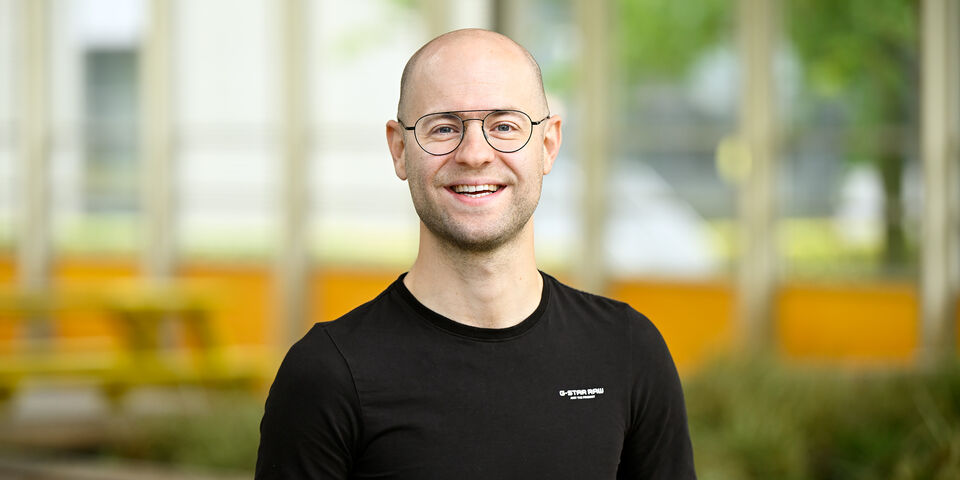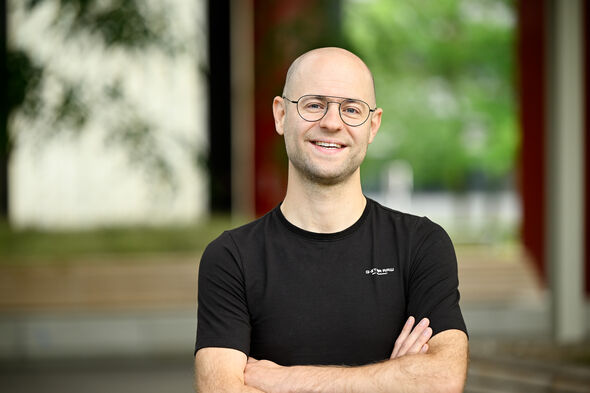Double honor: not one, but two awards for Loe Schlicher
Loe Schlicher can add two professional honors to his name this fall: the TU/e Best Bachelor Teacher Award and the KNAW Early Career Award. Thus, there is ample appreciation for both the educational and academic skills of the university lecturer at IE&IS, who specializes in game theory. Choosing between research and teaching? Not an option for him: “It’s the combination that makes it golden.”
Coming from a family of teachers in Limburg, Schlicher describes himself as “a true TU/e person.” As a first-year Industrial Engineering and Management Sciences student, he walked onto campus via the Limbopad and never really left – except for a brief appointment at the Netherlands Defence Academy in Breda between 2018 and 2020.
His connection to the security sector remains, though his focus has shifted from green — the military — to blue: “As a researcher, I collaborate with the police, the Royal Netherlands Marechaussee, and the National Coordinator for Counterterrorism and Security.”
His area of expertise, game theory, lends itself well to calculating the optimal deployment of, for example, anti-terror units during incidents or surveillance teams in response to threats. Schlicher previously spoke about this in Cursor and also made a podcast (in Dutch) about his research for the Universiteit van Nederland.
Citation score
One side effect of these collaborations is that Schlicher cannot publish all of his research. Some findings cannot be disclosed — it wouldn’t be wise if criminals or terrorists could read how the police operate. Precisely for this reason, he is particularly pleased with the Early Career Award granted to him by the Royal Netherlands Academy of Arts and Sciences (KNAW), which he will receive on November 18.
“I haven’t seen the jury report yet, but I did read the recommendation letter by Ivo Adan, full professor in our Operations, Planning, Accounting and Control group. He emphasized the unique position of my type of research: it’s very rewarding to contribute to societal goals, but academia isn’t really designed for it.”
After all, you end up writing fewer papers than your colleagues, Schlicher explains. “Sometimes it’s possible to publish about a model by applying it to a completely different case, but not always.” As a result, your citation score is lower, while that number partly reflects the perceived quality and impact of your work.
Recognition
“Ideally, there should be a framework to structurally recognize and value this kind of research within universities,” Schlicher argues. He hopes — and suspects — that the KNAW award, which is connected to the Recognition & Rewards movement, can be interpreted as exactly that: a sign of appreciation, “and of support — that this too is a valid path for an academic.”
With the collaboration with the Ministry of Defence coming up, the question of how to evaluate research that had to remain confidential, is also becoming increasingly relevant at TU/e. Schlicher is exploring the topic within the Eindhoven Young Academy of Engineers. “For example, the university could create hybrid positions, allowing an organization to give part-time appointments to researchers who make a significant contribution.”
The Early Career Award comes with a prize of 15,000 euros. Schlicher has yet to decide how to spend it. “One idea I’m considering is to organize an event — if possible — for academics and other professionals who also work under confidentiality constraints. I’d like to learn what drives them and how they deal with that.”
Annuity mortgage
And then there’s that other award: the Best Bachelor Teacher Award, presented during MomenTUm at the end of September. Interestingly, Schlicher received it for a lecture series on a subject outside his field: an introductory course on investing and financial accounting. He devoted a lot of time to revamping it.
“What I wanted was for students — when they start investing or buy a house — to actually understand the system behind the stock market or an annuity mortgage,” he says. The result was a course that, according to one resit student who had taken it before, had become “one and a half times as difficult and twice as meaningful.”
Schlicher is eager to develop his own course on domestic security next. The Teacher Award also comes with 15,000 euros in prize money. “I’m planning to use that to record videos for my course, featuring security experts as guest speakers.”
Tinkering
Schlicher’s dedication to quality — even when it costs “an ungodly amount” of preparation time — is something his students appreciate, along with the infectious enthusiasm that radiates from him when he explains something (as Cursor can confirm). So what would he choose if he had to decide between research and teaching?
That’s an impossible question for Schlicher. “It’s the combination that makes it golden. Doing research is wonderful, but it also means spending days tinkering away, seemingly without progress. Experience tells me that’s just part of the process — but how great is it to teach a class on such a day, to convey something meaningful to students, and to experience the sense of fulfillment that brings?”
Schlicher couldn’t do without the puzzling and problem-solving that research entails, “but the highs I experience while teaching — I wouldn’t want to miss those either.”
This article was translated using AI-assisted tools and reviewed by an editor



Discussion